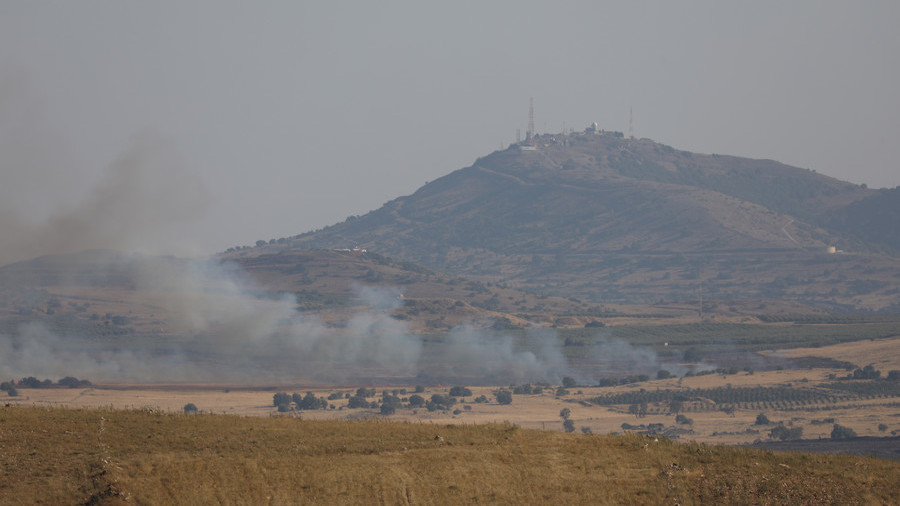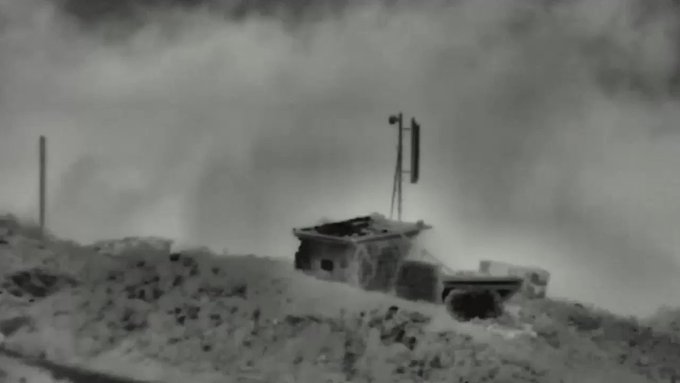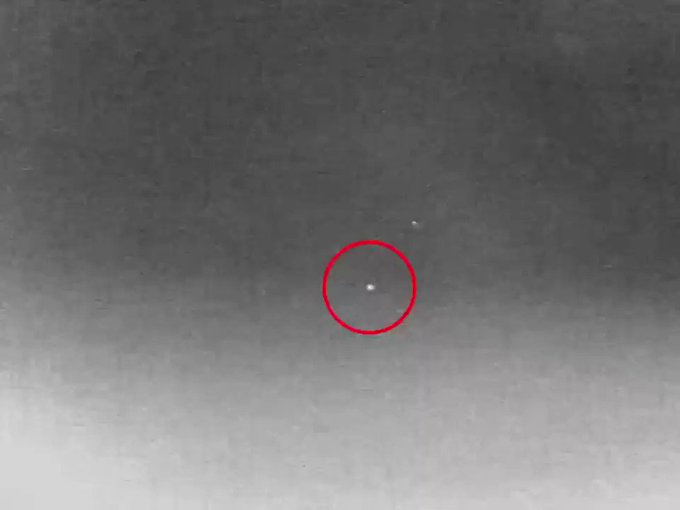Israel
strikes Syrian army positions near Golan Heights, vows to ‘decisively
protect sovereignty’

RT,
11
July, 2018
Several
missiles launched by Israeli aircraft have struck Syrian army
positions in the Quneitra Governorate near the Israeli-occupied Golan
Heights, in what the IDF called a retaliation for an earlier drone
infiltration.
The
attack caused “limited
damage” at
some of the army positions in the vicinity of the towns of Hader and
Tell Kurum, the Syrian Arab News Agency reported, providing no
further details of the incident.
The
IDF soon confirmed targeting sites in Syria, claiming it was their
response to a drone infiltration earlier on Wednesday.
“The
IDF targeted three military posts in Syria in response to the
infiltration of the Syrian UAV into Israel that was intercepted by
the IDF earlier today,” the
IDF said, posting footage of the strikes. “The
IDF will continue to operate determinedly and decisively against any
attempts to hurt Israeli civilians and breaches of Israeli
sovereignty.”
Earlier tonight, Wednesday July 11th, the IDF targeted three military posts in Syria in response to the infiltration of the Syrian UAV into Israel that was intercepted by the IDF earlier today
Noting
that the Israeli military is prepared for many different scenarios,
the army stressed that it holds the Syrian government “accountable
for the actions carried out in its territory and warns it from
further action against Israeli forces.”
Earlier
on Wednesday, the IDF used a Patriot missile to take down a
surveillance drone that allegedly penetrated some 10km deep into the
airspace over the occupied Golan. A similar engagement was witnessed
on June 24.
Israel
has intensified its bombing of military infrastructure in Syria over
the last couple of months, despite the conflict winding down, with
terrorists and extremist militants controlling ever-decreasing
swathes of land and so-called ‘moderates’ joining the state-wide
reconciliation process in growing numbers.
Arguing
that the Iranian presence in the Arab Republic and its strong
foothold on its borders jeopardizes national security, Israel
reserved the right to strike Iran-affiliated targets and weapons
shipments destined for Hezbollah.
“We
won’t take action against the Assad regime, and you get the
Iranians out,” Benjamin
Netanyahu allegedly told Vladimir Putin during a meeting in Moscow on
Wednesday, adding that Israel will continue to protect its border
from air and land.
While
the IDF does not comment on every engagement on its neighbor’s
territory, previously acknowledged targets by Israel in Syria
included weapons storage facilities, logistics sites, and
intelligence centers.
The
government of Bashar Assad views the Israeli hostility as a violation
of the nation's sovereignty, arguing that strikes only help the
terrorists on the ground. Damascus also repeatedly denied that the
Iranian military has any significant presence in Syria, noting that
only the Islamic Republic's military advisers are currently present
on the ground.
Syrian War Report – July 11, 2018: YPG Carries Out Series Of Attacks Against Turkish-backed Forces
By
Robert Inlakesh
DAMASCUS,
SYRIA (4:50 A.M)- The Israeli Regime has tightened its blockade of
the Gaza Strip, strangling the civilian population and pushing Hamas
towards a new military confrontation.
Yesterday,
the Israeli Regime made a decision to tighten its crippling blockade
of the Gaza Strip. The decision entailed the closure of Karem Abu
Salem, crossing in Gaza from Israel, which will effectively destroy
what remains of Gaza’s small economy.
The
closure of the Karem Abu Salam crossing will mean than nothing can be
imported, nor exported into/out of the Gaza Strip. All that is to be
permitted into Gaza, is urgent humanitarian aid (such as food). Even
items such as clothing goods, plastics and construction material are
to be forbidden entry into Gaza.
The
Gaza Strip, which has remained in a declared ‘state of emergency’,
as of late February this year (Declared on 21/02/18), is on the brink
of complete collapse.
In
February of 2017, the Palestinian Authority decided to cut off Gaza’s
supply of diesel fuel. Diesel fuel meant for Gaza, that their sole
power plant – only semi-operational due to various Israeli aerial
bombardments – would increase the amount of power provided for
Gaza’s population of 2 million. Mahmoud Abbas (PA President) also
made the move early this year, to sanction Gaza, refusing to pay
salaries to Palestinian Authority (PA) members living in Gaza.
For
Gaza’s population of 2 million, which consists of over 1 million
children (aged 18 or younger), the situation is now officially the
worst it has ever been.
More
than 80% of Gazan’s face blackouts, which last up to and past 22
hours of their day. The un-employment rate in Gaza is 46%, 60+%
amongst the youth. Around 100 million liters of un-treated sewerage
floods Gaza’s un-swimmable 25 mile long beach, every year. Crime
rates are up, suicide rates – especially amongst the youth – are
sky-rocketing and more people are pushed below the poverty line every
day. Gaza is also one of the most densely populated areas on earth
and home to a population of 70+% refugees. Hospitals have become
overwhelmed, disease is on the rise and even the sewerage floods the
streets, as the lack of electricity disabled pumps.
Benjamin
Netanyahu, the Prime Minister of the Israeli Regime, claims that the
tightening of the illegal 12 year-ongoing blockade is in response to
burning balloons and kites flown into Israeli annexed territory. The
Israeli Regime hold Hamas accountable for the kites/balloons, which
have inflicted millions in damage of Israeli property. The claim that
Hamas have launched the kite/balloon initiative, has no evidence to
back it up.
Palestinians
in Gaza now fear an upcoming confrontation between Hamas and Israel,
as the besieged coastal enclave is all but strangled. The tightening
of the siege will now mean for Hamas, that they most negotiate or
confront Israel militarily. A military confrontation however, seems
much more likely, as Israel are not trusted or engaged with by the
Hamas leadership and are historically incapable of making a
concession.





No comments:
Post a Comment
Note: only a member of this blog may post a comment.